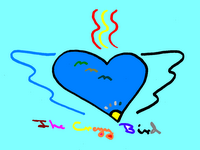 At the beginning of the "Arrogant Prophecies" the unknown poet of the Third Galaxy, apologized for revealing to us the visions which troubled him.
At the beginning of the "Arrogant Prophecies" the unknown poet of the Third Galaxy, apologized for revealing to us the visions which troubled him.The reader by now begins to understand that this was not simply a rhetorical device on his part. With each installment, the pictures become darker and more nightmarish. They sometimes bear an eerie resemblance to the science fiction worlds of such writers as Cordwainer Smith and C. M. Kornbluth. There is nothing odd in this -- I can hardly be the only one to ever channel information from the Third Galaxy!
"Hungry Freaks" describes a world regimented by conglomerated economic entities and everyone has their personal identification imbedded in the body. As a sop to the illusion of freedom, the people are guaranteed such basic necessities as the "right to see" and the "right to eat". However, although the "right to see" is irrevocable, the "right to eat" can be lost. The reason for this is simple: all the "right to eat" actually entailed was being able to collect food from the Food Stores -- what we would call a supermarket. The "customers" would take down the Cruchies, Munchies, Popsies, Drinkies and Smokies from the shelves and put them in the shopping cart. At the check-out stand, they simply put their hand under the scanner.
The amount was then automatically registered to their individual account. With a system like this, with everyone more or less living off the cuff, most common folk were always in debt to the MegaCorps. In their benevolence, the MegaCorps rarely called for immediate payment and it was only "troublesome" people who ever had their accounts canceled. This was indeed a serious matter and such folk, known in the common parlance as "freaks" had great difficulty in getting food. In general though, it was an excellent system with little visible public unrest -- whatever riots which may have occurred were of course never shown on the obsequious public television screens. Television was very important in maintaining this system, therefore the "right to see" was inviolable -- in fact, it was a serious crime to turn off a television.
As the unknown poet left almost no notes to this particular poem, I have had to confine myself to that which I know to be the case in the Third Galaxy from other sources. Elmer Eggplant, who is probably the most cogent commentator on the "Arrogant Prophecies" maintains that the idea for this particular poem is taken from the Book of the Holy Idaho, Revulsions 13:11-18, to be exact. This may well be the case, as the unknown poet was known to often make use of images from the Book of the Idaho.
Most commentators in the Third Galaxy, however, draw a blank as to the meaning of "kringleberries". One commentator, not otherwise generally recognized for reliability, points to the final lines in the "Imbuggeration" and claims that "kringleberries" refer to human brains. This seems rather ghoulish as well as ridiculous, however, "super secret atrocities" does appear in both places, therefore I mention it.
It was the Eighteenth Year of the First World Peace____________________________________________
and everyone was working for the Money Machine.
True, there were some hungry freaks,
but that was only because they'd lost their "right-to-eat".
Without a microchip in their hand,
no one would dare to stick it under the check-out stand.
(The steel jaws of the Money Machine
hide below the supermarket data screens!)
If I. T. responds that you can't pay,
I. T. clamps and holds you tight until they take you away.
When it's found that you're not "registered",
the Wish of the Supreme Hole will then be heard!
(These super secret atrocities,
are cutely disguised as National Security!)
Far below the clicking relays,
the Wish slowly strips delicate kringleberries...
I.T. (pronounced: "aye tee") = information technology




No comments:
Post a Comment